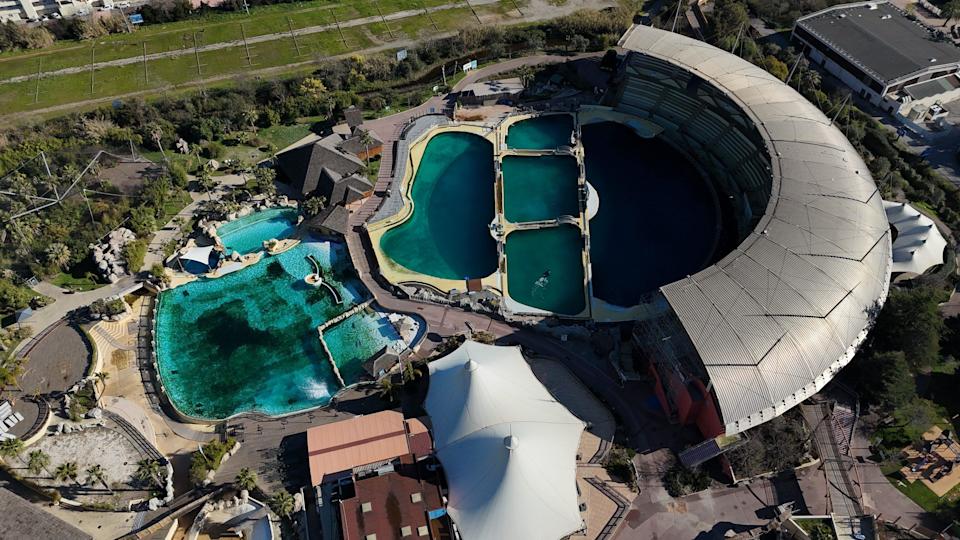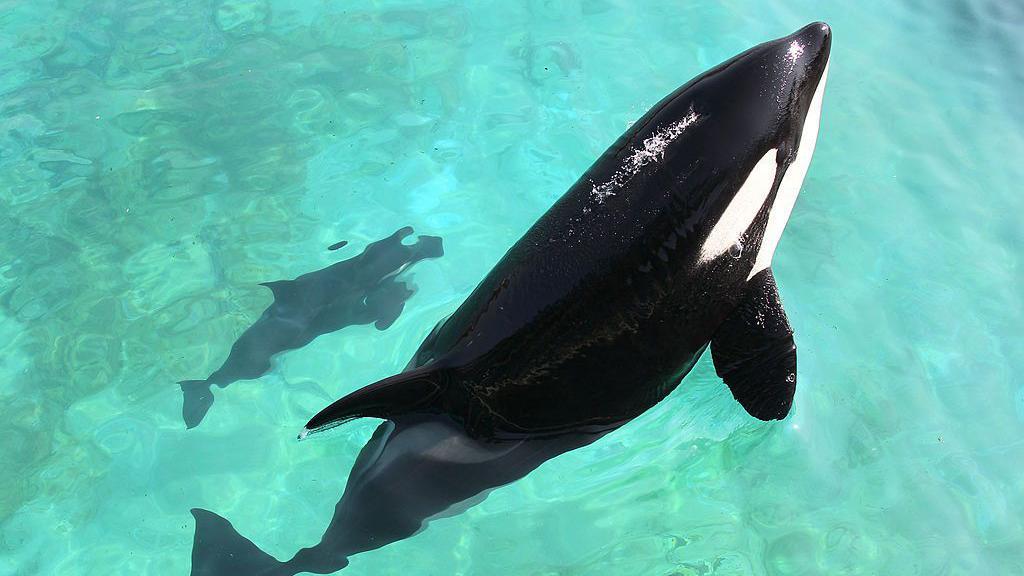The French government has been urged to reconsider rehoming two stranded killer whales in Canada.
Wikie, 23, and her 11-year-old son Keijo are currently held at Marineland Antibes, a marine zoo in southern France, where they were born and have been kept their entire lives. It closed in January.
An application to send them to the most likely rehoming destination – Loro Parque marine zoo in Tenerife – was blocked by Spanish authorities. Loro Parque is already home to four orcas, including one born last month.
Lori Marino, president of The Whale Sanctuary Project (WSP), said their site in Nova Scotia is “the only option left”, as French authorities have not yet identified a location in Europe for orcas and rejected a move to a marine zoo in Japan.
Her group is bidding to rehome the orcas in the east Canadian province despite a previous offer being rejected by the French ministry for ecology earlier this year.
Animal rights groups want the orcas to be rehomed in a whale sanctuary where they will have more space to swim and will not be forced to breed or perform in shows.
Agnès Pannier-Runacher, the French ecology minister, said in February she was looking for a European sanctuary but a suitable site for Wikie and Keijo has not been secured yet.
“If you don’t even have a site, you’re years away from being a viable sanctuary,” said Lori, adding that the WSP had already carried out environmental studies, water surveys and been offered a lease by Canada’s department of natural resources.
Morgan and her young calf, who was born last month at Loro Parque in Tenerife [Loro Parque]
Managers at Marineland said sanctuaries are a hypothetical that “will take years” to be built and with “no guarantees” the whales will be properly looked after.
They stressed that Wikie and Keijo “must leave now” for their own welfare, adding: “Marineland reaffirms the extreme urgency of transferring the animals to an operational destination.”
Though Marineland has closed as a marine zoo business, they are still legally responsible for the welfare of the animals until they are rehomed.
The application to move them to Loro Parque was described as a temporary measure by Pannier-Runacher that would bridge the gap until a sanctuary in Europe had been found and built.
But activists feared the transfer would end up being permanent. The decision by a Spanish scientific panel to block it came as a pleasant surprise to many of them.
“I was shocked,” Lori told BBC News. “We thought it was a fait accompli. We assumed that was where the orcas were going, it looked like a done deal.”

Marineland Antibes closed in January but is still home to orcas Wikie and Keijo [Getty Images]
The scientific panel’s approval was needed to complete the transfer but they concluded Loro Parque’s facilities did “not meet the minimum requirements in terms of surface area, volume and depth necessary to house the specimens in optimal conditions”.
Dr Jan Schmidt-Burbach, head of animal welfare and wildlife research at the charity World Animal Protection, said the decision was “unexpected but rational”.
He added that it “perfectly illustrates the fact that marine parks are an outdated industry with dropping acceptability” in society.
Loro Parque responded to the panel’s decision by saying their “facilities are recognised by independent assessors as providing among the highest levels of animal welfare in the world”.
The WSP has identified a site in Port Hilford Bay, Nova Scotia that they plan to cordon off using 1,600m of nets.
The project’s team also contains people who were involved in a whale sanctuary that was created to house Keiko – the orca who starred in the 1993 movie Free Willy.
Charles Vinick, CEO of the WSP, managed the Keiko project in Iceland and Jeff Foster, who specialises in moving marine animals, was also part of that team.
Keiko was born in the wild and was able to relearn some survival skills after arriving at the sanctuary in 1998.
He spent four years there before leaving with a pod of orcas he had joined. They swam to Norway where he died in 2003 following an infection.
There is no chance Wikie and Keijo will be released into the wild as, unlike Keiko, they were born in captivity.
They have spent their whole lives being cared for and entertained by their trainers. Lori says they would be similarly cared for in Nova Scotia but have much more space to live in than a pool.
“We have a whole crew who know how to build and run a sanctuary,” said Lori. “They have done it before and I think we are the only team who has any experience in doing this.”
Lori and the WSP team contacted the ministry after learning the transfer to Loro Parque had been blocked. At time of writing, they had not received a response.
BBC News also contacted the ministry for comment. Pannier-Runacher had not made any new announcements about what will happen to the orcas.
Until a decision is made Wikie and Keijo remain in Marineland, unaware the rest of their home is now empty.
Read the full article here


